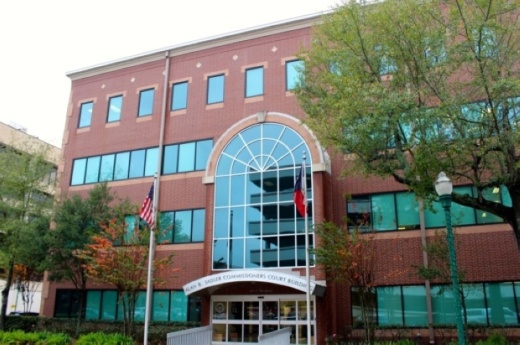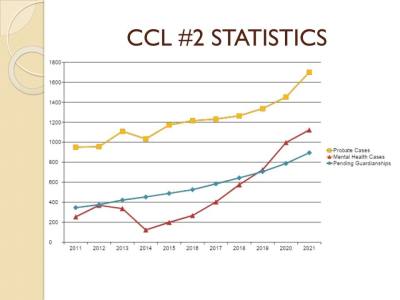Montgomery County commissioners unanimously approved a resolution March 8 supporting legislative action to change one of the county’s courts at law to a probate court.
County Court at Law No. 2, presided over by Claudia Laird—who presented the item to commissioners—will become Montgomery County Probate Court No. 1, according to a previously approved Jan. 7 resolution from the county’s board of judges consisting of all five county court judges and all nine district court judges.
In an emailed statement to Community Impact Newspaper, Laird said the next step would be for the next state legislative session to pass bills officially changing the court at law. During the March 8 meeting, Laird said the probate court would likely take effect at the end of 2023, following the county’s new County Court at Law No. 6.
“It gives us a year to work cases into [County Court at Law No.] 6, and then we will become a statutory court at the end of 2023,” Laird said.
According to the Texas State Law Library, probate courts handle matters relating to a person’s estate after they die. Laird said the statutory probate court would also handle questions of guardianship, mental health and related eminent domain cases.
Laird presented statistics showing probate cases filed annually with County Court at Law No. 2 have increased from just over 1,000 in 2014 to approximately 1,700 in 2021. Mental health cases increased from under 200 in 2014 to about 1,100 in 2021, while guardianship cases increased from just over 400 to 900 in the 2014-21 timeframe.
The amount of time foster children in Texas are spending in hotels, offices and other inadequate places has risen by more than 1,000% since December 2019, Community Impact Newspaper previously reported. Laird added that the new court at law will help ease the caseload burden the county’s courts are suffering.
Precinct 2 Commissioner Charlie Riley asked whether the changeover would increase a case burden on other county courts. Laird responded, saying it would reduce caseloads for district courts, in combination with the new County Court at Law No. 6.
New court to handle all probate cases
Laird said one of the benefits of enacting a statutory probate court would be an additional $200,000 in filing fees returning from the state as part of a Texas incentive for counties to enact probate courts.
“If you’re a statutory probate court, you get a bigger dollar value back per case filed,” Laird said. “That’s coming back into our community to use for our taxpayers ... and that number will go up as case filings go up.”
Laird told commissioners converting the court would be a “one-stop shop” for probate cases and would allow her to pull all probate cases into her court. As it stands, cases regarding a person’s death in Montgomery County may be split across different courts depending on the matters discussed at the court, Laird said.
Laird said another benefit for converting the court would be reducing the amount the county needs to spend on visiting judges who take the place of judges who have recused themselves. Visiting judges are paid per half-day; with a statutory probate court, Laird said only specialized judges could be authorized to sit on the bench, but they would be more familiar with probate law and would require fewer visits.
“If the judge is a general jurisdiction judge, they may have only handled a few probate cases, and it takes them longer and more days and more visits to resolve the case,” Laird said. “It costs you money every time they come out.”
Other benefits include making an investigator, a court visitor program and an auditor mandatory for the probate court’s operation. Laird said County Court at Law No. 2 already has these programs, but they were not necessary as a county court.
“These are people specialized for guardianship of the 700 wards that are monitored by this court,” Laird said. “It means another judge can’t come in and say, ‘We don’t need people to visit [these wards].’”
Other counties with operating statutory courts include Bexar, Collin, Dallas, Denton, El Paso, Galveston, Harris, Hidalgo, Tarrant and Travis.






